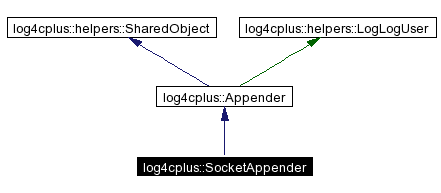
#include <socketappender.h>
Inheritance diagram for log4cplus::SocketAppender:


Public Member Functions | |
| SocketAppender (const log4cplus::tstring &host, int port, const log4cplus::tstring &serverName=tstring()) | |
| SocketAppender (const log4cplus::helpers::Properties properties) | |
| ~SocketAppender () | |
| virtual void | close () |
| Release any resources allocated within the appender such as file handles, network connections, etc. | |
Protected Member Functions | |
| void | openSocket () |
| virtual void | append (const spi::InternalLoggingEvent &event) |
Protected Attributes | |
| log4cplus::helpers::Socket | socket |
| log4cplus::tstring | host |
| int | port |
| log4cplus::tstring | serverName |
The SocketAppender has the following properties:
SocketAppenders do not use a layout.
Remote logging uses the TCP protocol. Consequently, if the server is reachable, then log events will eventually arrive at the server.
If the remote server is down, the logging requests are simply dropped. However, if and when the server comes back up, then event transmission is resumed transparently. This transparent reconneciton is performed by a connector thread which periodically attempts to connect to the server.
Logging events are automatically buffered by the native TCP implementation. This means that if the link to server is slow but still faster than the rate of (log) event production by the client, the client will not be affected by the slow network connection. However, if the network connection is slower then the rate of event production, then the client can only progress at the network rate. In particular, if the network link to the the server is down, the client will be blocked.
On the other hand, if the network link is up, but the server is down, the client will not be blocked when making log requests but the log events will be lost due to server unavailability.
Definition at line 68 of file socketappender.h.
|
||||||||||||||||
|
|
|
|
|
|
|
|
|
|
|
|
|
Release any resources allocated within the appender such as file handles, network connections, etc. It is a programming error to append to a closed appender. Implements log4cplus::Appender. |
|
|
|
|
|
Definition at line 87 of file socketappender.h. |
|
|
Definition at line 88 of file socketappender.h. |
|
|
Definition at line 89 of file socketappender.h. |
|
|
Definition at line 86 of file socketappender.h. |
 1.3.2
1.3.2